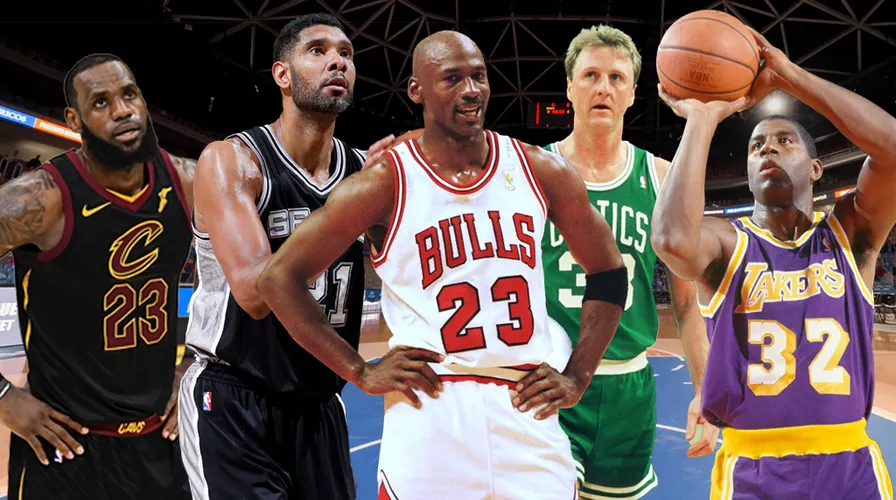The 2019-20 NBA season was in full swing before it was put on hold due to the effects of the coronavirus pandemic. With over two months of no games, fans across the globe were starving for basketball; luckily ESPN's "The Last Dance" documentary delivered.
The 10-part film, on NBA legend Michael Jordan and the 1990's Chicago Bulls teams that won six championships, gave fans something to look forward to every Sunday night for several weeks while sports was on hold.
Jordan is regarded by many as the greatest basketball player of all-time. And in honor of one of the most iconic athletes in all of professional sports, we've decided to put together a list of the 23 greatest players in NBA history.
This list takes everything into effect: NBA championships, All-NBA teams, NBA All-Star appearances, individual awards and accolades, longevity, legacy and what they did for the NBA and the game of basketball.
But first, here are five players who just missed the cut.
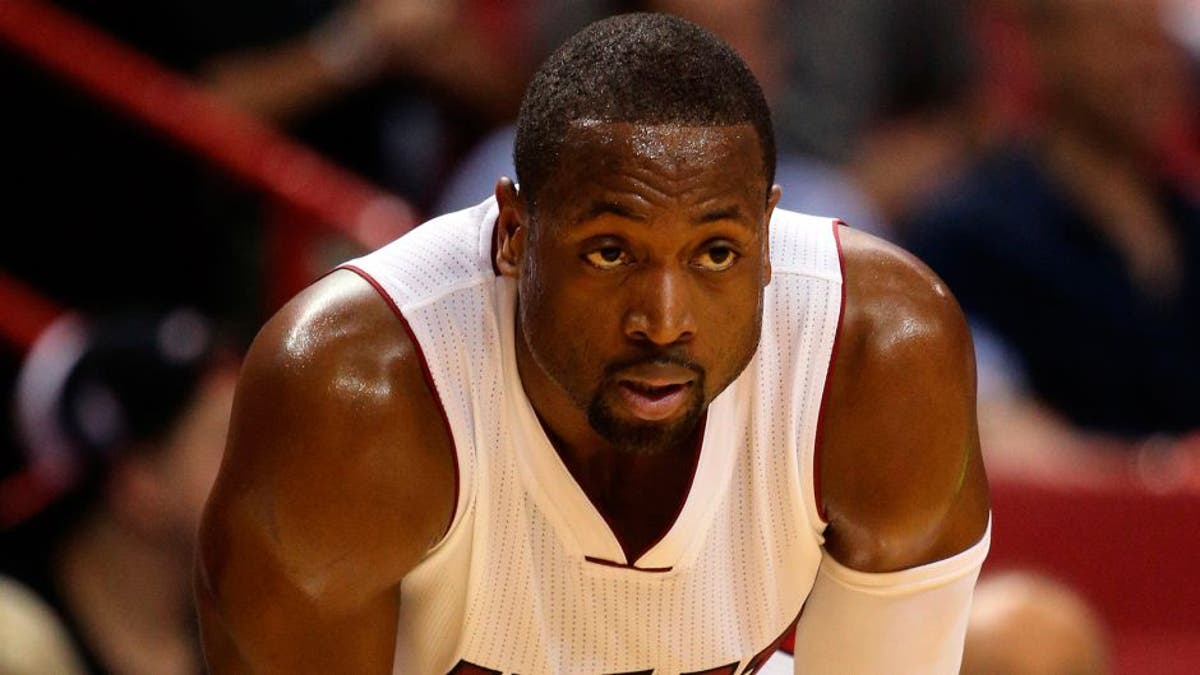
Miami Heat legend Dwyane Wade was one of five players who just missed the cut on the list of the 23 greatest players in NBA history.
(Steve Mitchell-USA TODAY Sports)
DWYANE WADE: Recognized as one of the greatest shooting guards of all-time, Wade was the fifth-overall pick in the 2003 NBA Draft. In his third season, he led the Miami Heat to its first championship in franchise history, and he was honored as the 2006 NBA Finals MVP. Wade finished his career as a three-time NBA champion and 13-time NBA All-Star.
ELGIN BAYLOR: Drafted by the Minneapolis Lakers with the first-overall pick in the 1958 NBA Draft, Baylor was an 11-time NBA All-Star, and 10-time All-NBA first-team selection. Baylor played in eight NBA Finals, but never came away with a championship.
JOHN STOCKTON: Another all-time great player who failed to win a title in his Hall of Fame career, Stockton spent his entire 19-year career with the Utah Jazz. He led the franchise to back-to-back NBA Finals appearances in 1997 and 1998, but lost to the Chicago Bulls. Stockton has the most assists and steals in NBA history.
JOHN HAVLICEK: The Boston Celtics all-time great is one of four players in league history to have won eight or more NBA titles. Only teammates Bill Russell (11), and Sam Jones (10) have more championships than Havlicek, who was a 13-time All-Star in 16 NBA seasons.
ISIAH THOMAS: Considered one of the greatest point guards in league history, Thomas led the "Bad Boy" Detroit Pistons to back-to-back championships in 1989 and 1990. Thomas, the No. 2 overall pick in the 1981 NBA Draft, was a 12-time NBA All-Star, and three-time All-NBA first-team honoree.
Now, here are the 23 greatest players in NBA history.
**
23) SCOTTIE PIPPEN
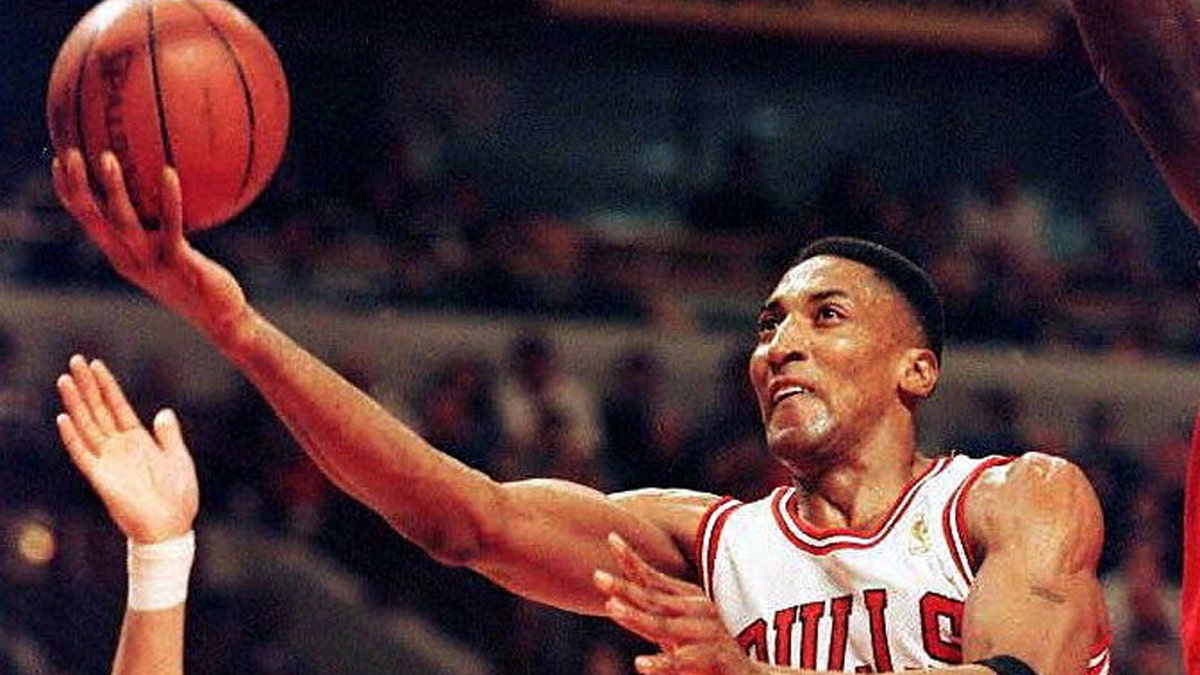
Chicago Bulls great Scottie Pippen comes in at No. 23 on the list of the greatest players in NBA history. (Photo credit: JEFF HAYNES/AFP via Getty Images)
YEARS PLAYED: Chicago Bulls (1987-1998); Houston Rockets (1998-1999); Portland Trail Blazers (1999-2003); Chicago Bulls (2003-2004)
CAREER STATISTICS: 16.1 PPG, 6.4 RPG, 5.2 APG
LIST OF ACCOLADES: 6x NBA Champion; 7x NBA All-Star; 3x All-NBA First Team; 2x All-NBA Second Team; 2x All-NBA Third Team; 8x NBA All-Defensive First Team; Basketball Hall of Fame Class of 2010
WHY IS SCOTTIE PIPPEN NO. 23?
Pippen's Chicago Bulls teammate and NBA icon Michael Jordan said it best in Episode 2 of "The Last Dance" documentary:
"Whenever they speak Michael Jordan, they should speak Scottie Pippen," Jordan said. "When everybody says, 'Well, I won all these championships,' but I didn’t win without Scottie Pippen. That’s why I consider him my best teammate of all-time."
According to his biography on the Basketball Hall of Fame's website, Pippen, the ultimate Swiss Army knife, "ran the court like a point guard, attacked the boards like a power forward, and swished the nets like a shooting guard."
**
22) DAVID ROBINSON

David Robinson of the San Antonio Spurs is No. 22 on the list. Mandatory Credit: Ronald Martinez/Allsport
YEARS PLAYED: San Antonio Spurs (1989-2003)
CAREER STATISTICS: 21.1 PPG, 10.6 RPG, 3.0 BPG
LIST OF ACCOLADES: 2x NBA Champion; 1995 NBA MVP; 1992 NBA Defensive Player of the Year; 10x NBA All-Star; 4x All-NBA First Team; 2x All-NBA Second Team; 4x All-NBA Third Team; 4x NBA All-Defensive First Team; 4x NBA All-Defensive Second Team; Basketball Hall of Fame Class of 2009
WHY IS DAVID ROBINSON NO. 22?
Nicknamed "The Admiral" while at the United States Naval Academy, Robinson turned into one of the greatest centers in the history of the league.
To this day, Robinson -- who is the only player from the Naval Academy to play in the NBA -- joined the Spurs two years after being drafted No. 1 overall in the 1987 NBA Draft because he had to fulfill his commitment to the Navy. Once he began his basketball career, he instantly turned the small-market franchise into a yearly contender.
Robinson is one of only four players to have a quadruple-double in a single game. On Feb. 17, 1994, he finished with 34 points, 10 rebounds, 10 assists, and 10 blocks against the Detroit Pistons. He is a three-time Olympian, which includes two gold medals (1992, 1996) and one bronze medal (1988), and he was a member of the 1992 "Dream Team."
WARRIORS' STEVE KERR CREDITS SUCCESSFUL NBA CAREER TO MICHAEL JORDAN: 'I OWE HIM EVERYTHING'
**
21) CHARLES BARKLEY

Charles Barkley of the Phoenix Suns comes in at No. 21 on the list of the greatest players in NBA history. (Photo by Focus on Sport/Getty Images)
YEARS PLAYED: Philadelphia 76ers (1984-1992); Phoenix Suns (1992-1996); Houston Rockets (1996-2000)
CAREER STATISTICS: 22.1 PPG, 11.7 RPG, 3.9 APG
LIST OF ACCOLADES: 1993 NBA MVP; 11x NBA All-Star; 5x All-NBA First Team; 5x All-NBA Second Team; 1x All-NBA Third Team; Basketball Hall of Fame Class of 2006
WHY IS CHARLES BARKLEY NO. 21?
Barkley, one of the greatest players to never win a championship, was one of the most dominant power forwards in NBA history. Listed at 6-foot-6, Barkley was actually closer to 6-foot-4, and he is the shortest player ever to lead the NBA in rebounding, when he averaged 14.6 rebounds per game during the 1986-87 season as a member of the 76ers.
The 1993 NBA MVP, Barkley led the Suns to the best record in the league, and they reached the NBA Finals, but fell to Jordan and the Bulls. When Barkley retired in 2000, he became the fourth player in NBA history to have 20,000+ points, 10,000+ rebounds, and 4,000+ assists. The other three players with that incredible feat are Wilt Chamberlain, Kareem Abdul-Jabbar and Karl Malone.
In a SLAM Magazine issue which ranked the NBA greats, fellow Hall of Famer Bill Walton said that "Barkley is like Magic [Johnson] and Larry [Bird] in that they don't really play a position. He plays everything; he plays basketball. There is nobody who does what Barkley does. He's a dominant rebounder, a dominant defensive player, a three-point shooter, a dribbler, a playmaker."
**
20) MOSES MALONE
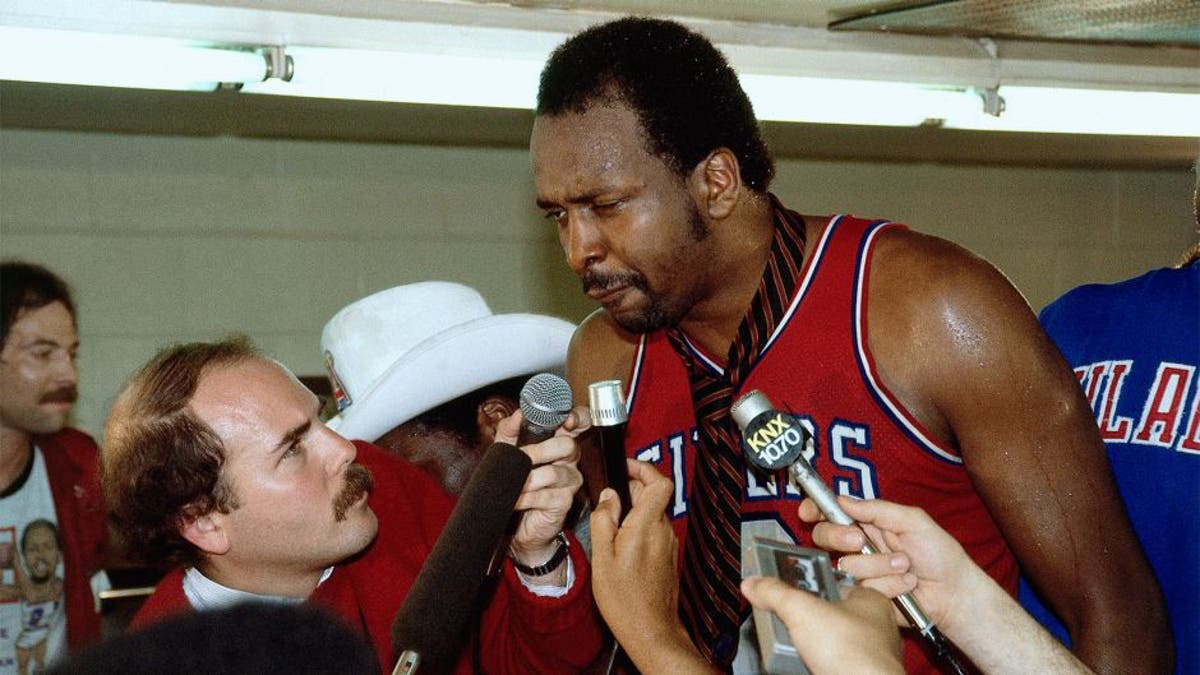
Moses Malone, an NBA champion with the Philadelphia 76ers, comes in as the No. 20 player. (Photo by Andrew D. Bernstein/ NBAE/ Getty Images)
YEARS PLAYED: Utah Stars (1974-1975); Spirits of St. Louis (1975-1976); Buffalo Braves (1976); Houston Rockets (1976-1982); Philadelphia 76ers (1982-1986); Washington Bullets (1986-1988); Atlanta Hawks (1988-1991); Milwaukee Bucks (1991-1993); Philadelphia 76ers (1993-1994); San Antonio Spurs (1994-1995)
CAREER STATISTICS: 20.3 PPG, 12.3 RPG, 1.3 BPG
LIST OF ACCOLADES: 1x NBA Champion; 1983 NBA Finals MVP, 3x NBA MVP; 12x NBA All-Star; 4x All-NBA First Team; 4x All-NBA Second Team; 1x NBA All-Defensive First Team; 1x NBA All-Defensive Second Team; 6x NBA Rebounding Leader; Basketball Hall of Fame Class of 2001
WHY IS MOSES MALONE NO. 20?
Malone, who played both in the ABA and NBA, entered professional basketball right out of high school -- the first modern player to do so -- and he was drafted in the third round of the 1974 ABA Draft by the Utah Stars. After the two leagues merged, Malone joined the Buffalo Braves, and then was traded to the Houston Rockets after two games.
Malone, who averaged more than 20 points per game for 11 straight seasons, also led the league in rebounding six times, and he averaged a double-double in points and rebounds for his career. Malone and fellow Hall of Famer Julius (Dr. J) Erving brought an NBA title to the 76ers in 1983.
Labeled an "aggressive and tenacious player" on the Basketball Hall of Fame's website, Malone retired in 1995 as the NBA's third-leading rebounder and fifth-leading scorer.
MICHAEL JORDAN'S UNTOLD STORY OF HOW HE SWITCHED BACK FROM NO. 45 TO NO. 23 WITH BULLS
**
19) STEPHEN CURRY
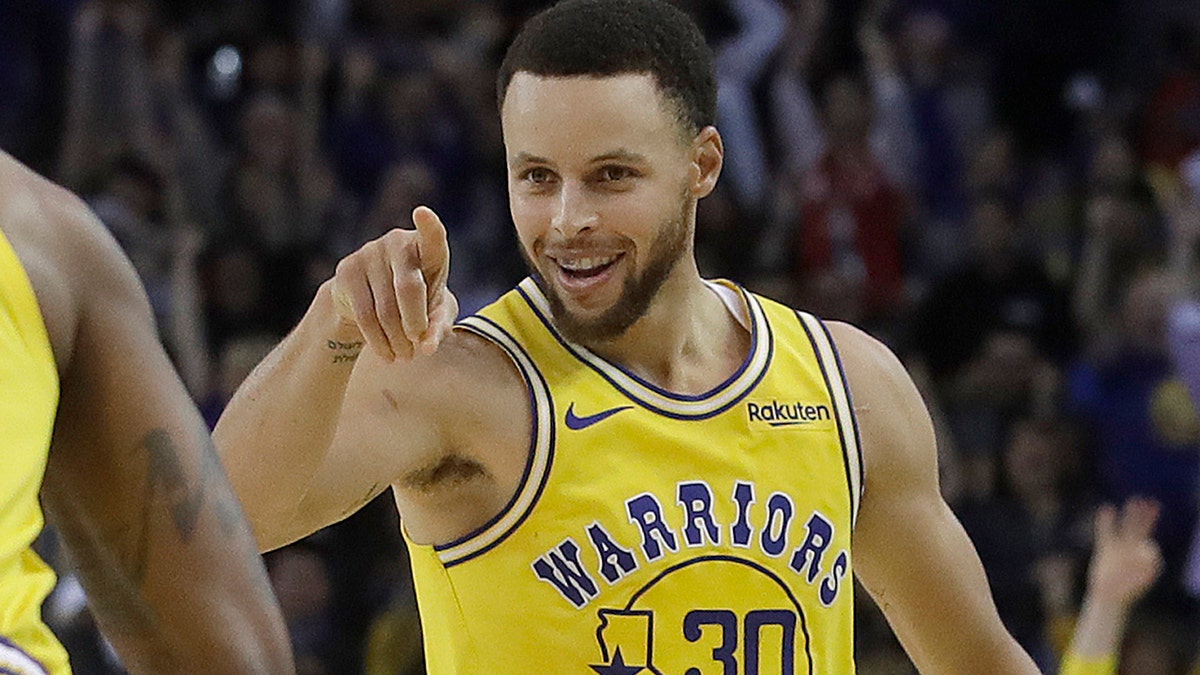
Steph Curry, the first unanimous NBA MVP in league history, is the No. 19 greatest player. (AP Photo/Jeff Chiu)
YEARS PLAYED: Golden State Warriors (2009-present)
CAREER STATISTICS: 23.5 PPG, 6.6 APG, 5.2 RPG
LIST OF ACCOLADES: 3x NBA Champion; 2x NBA MVP; 6x NBA All-Star; 3x All-NBA First Team; 2x All-NBA Second Team; 1x All-NBA Third Team; 2016 NBA Scoring Champion
WHY IS STEPHEN CURRY NO. 19?
Curry, a three-time NBA champion and two-time league MVP, is regarded by many as the greatest shooter in NBA history. Since he took the league by storm, he has been credited with transforming the game of basketball, and players entering the league regularly try to imitate his style of play.
In the 2014-15 NBA season, Curry led the Warriors to their first championship since 1975. The following year, Curry led the league in scoring, while shooting 50 percent from the field, 40 percent from three-point range, and 90 percent from the free-throw line. The Warriors broke the Chicago Bulls' record for most wins in a single season (73), but they lost to the LeBron James-led Cleveland Cavaliers in the NBA Finals.
Curry missed most of the 2019-20 campaign due to a broken left hand, but he is expected to return for the 2020-21 season at full strength. Curry has a lot of basketball left, and has a chance to move up even higher on this list.
**
18) KEVIN DURANT

Two-time NBA champion Kevin Durant is the No. 18 greatest NBA player of all-time. (AP Photo/Mark J. Terrill)
YEARS PLAYED: Seattle SuperSonics/Oklahoma City Thunder (2007-2016); Golden State Warriors (2016-2019); Brooklyn Nets (2019-present)
CAREER STATISTICS: 27.0 PPG, 7.1 RPG, 4.1 APG
LIST OF ACCOLADES: 2x NBA Champion; 2x NBA Finals MVP; 2014 NBA MVP; 10x NBA All-Star; 6x All-NBA First Team; 3x All-NBA Second Team; 4x NBA Scoring Champion
WHY IS KEVIN DURANT NO. 18?
Still actively playing, Durant still has a lot of great years left in him, and he could easily move up higher on this list. Listed at 6-foot-10 with an incredible 7-foot-5 wingspan, Durant is already one of the most prolific scorers the league has ever seen.
After leaving the Oklahoma City Thunder following the 2016 NBA season, Durant joined the Golden State Warriors and led them to two titles, and he earned NBA Finals MVP both times.
When the Warriors faced the Toronto Raptors in the 2019 NBA Finals, Durant, who missed the first four games of the series, suffered an Achilles tendon injury in Game 5, and he never played for the Warriors again. In the offseason, Durant and point guard Kyrie Irving signed with the Brooklyn Nets. He spent the entire 2019-20 year rehabbing his injured Achilles, and he's expected to make a full recovery ahead of the 2020-21 NBA season.
**
17) DIRK NOWITZKI
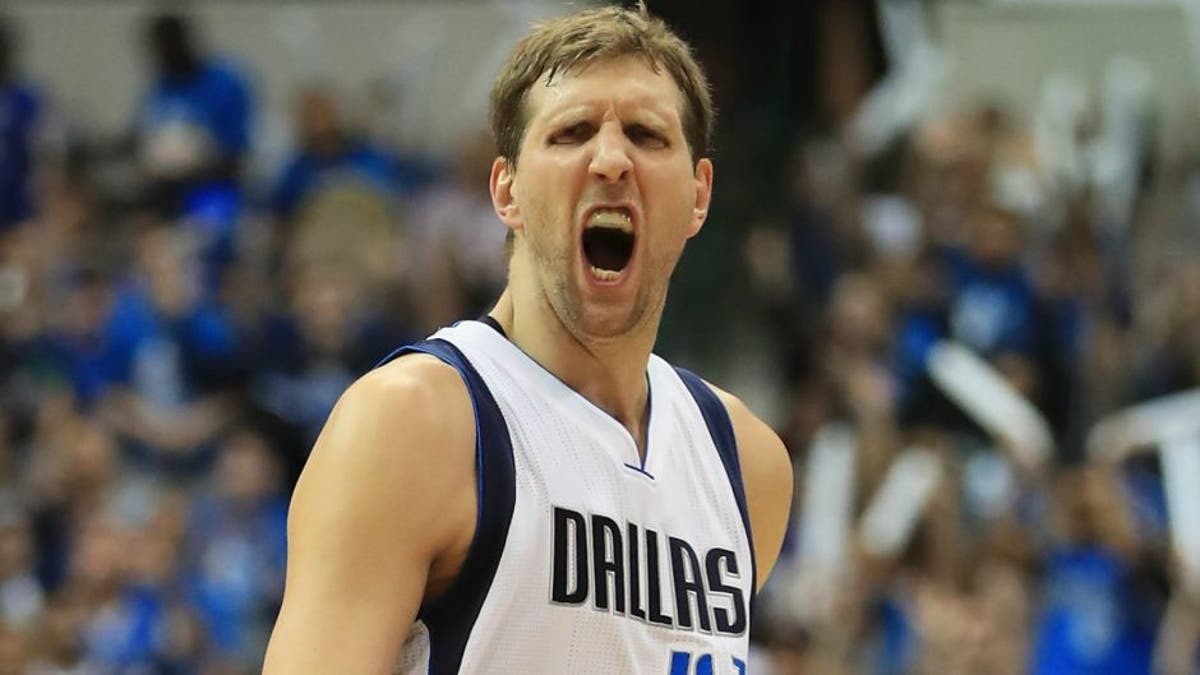
Dallas Mavericks great Dirk Nowitzki comes in at No. 17. (Photo by Ronald Martinez/Getty Images)
YEARS PLAYED: Dallas Mavericks (1998-2019)
CAREER STATISTICS: 20.7 PPG, 7.5 RPG, 2.4 APG
LIST OF ACCOLADES: 1x NBA Champion; 2011 NBA Finals MVP; 2007 NBA MVP; 14x NBA All-Star; 4x All-NBA First Team; 5x All-NBA Second Team; 3x All-NBA Third Team
WHY IS DIRK NOWITZKI NO. 17?
Nowitzki, the No. 9 pick in the 1998 NBA Draft, spent his entire 21-year career with the Dallas Mavericks, and he is recognized as the greatest European basketball player of all-time.
One of the best power forwards in league history, Nowitzki carried the Mavericks to the playoffs 15 times, including NBA Finals appearances in 2006 and 2011. He won his only NBA championship against the Dwyane Wade, LeBron James, and Chris Bosh-led Miami Heat in 2011.
Nowitzki, who will be a sure bet to make the Hall of Fame as soon as he is eligible, is known for his scoring, outside shooting, and trademark fadeaway jump shot, which is now emulated by many players of his size in the league, including Kevin Durant.
**
16) KARL MALONE
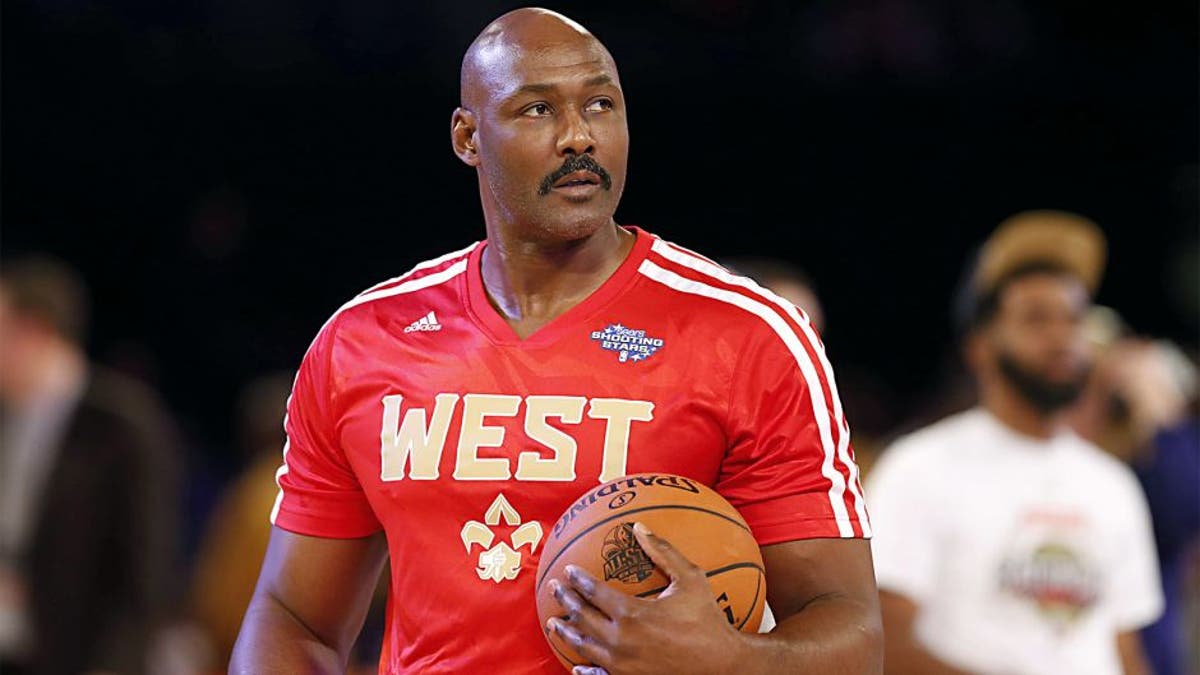
Karl Malone, the Utah Jazz great, is the No. 16 greatest NBA player in league history. Mandatory Credit: Derick E. Hingle-USA TODAY Sports
YEARS PLAYED: Utah Jazz (1985-2003); Los Angeles Lakers (2003-2004)
CAREER STATISTICS: 25.0 PPG, 10.1 RPG, 3.6 APG
LIST OF ACCOLADES: 2x NBA MVP; 14x NBA All-Star; 11x All-NBA First Team; 2x All-NBA Second Team; 1x All-NBA Third Team; 3x NBA All-Defensive First Team; 1x NBA All-Defensive Second Team; Basketball Hall of Fame Class of 2010
WHY IS KARL MALONE NO. 16?
Malone, one of the greatest power forwards in NBA history, is the highest-ranked player without a championship, and he is only one of two players on this list -- the other being Charles Barkley -- without a title.
Malone spent 18 seasons with the Utah Jazz, and was teamed up with legendary point guard John Stockton to form one of the greatest duos in league history. Every year of his career, Malone led his team to the playoffs, including back-to-back NBA Finals appearances in 1997 and 1998 against Michael Jordan and the Chicago Bulls.
"The Mailman" finished his career with 36,928 points, which is ranked second all-time behind the great Kareem Abdul-Jabbar. Malone finished with 2,000 or more points a record 12 times, including 11 seasons in a row. He is also tied with Kobe Bryant for the second-most All-NBA selections in NBA history, trailing only LeBron James.
MICHAEL JORDAN OR LEBRON JAMES? MAGIC JOHNSON HELPS SETTLE THE DEBATE
**
15) KEVIN GARNETT
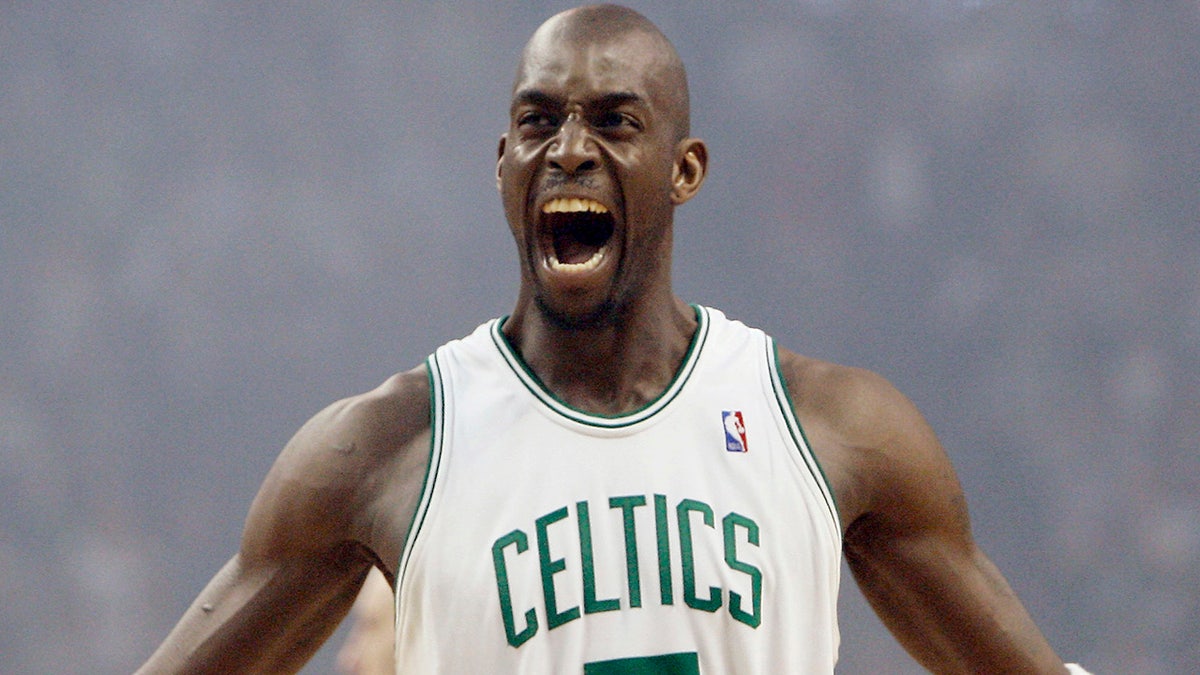
Kevin Garnett comes in at No. 15 on the list. (Photo by Associated Press)
YEARS PLAYED: Minnesota Timberwolves (1995-2007); Boston Celtics (2007-2013); Brooklyn Nets (2013-2015); Minnesota Timberwolves (2015-2016)
CAREER STATISTICS: 17.8 PPG, 10.0 RPG, 3.7 APG
LIST OF ACCOLADES: 1x NBA Champion; 2004 NBA MVP; 15x NBA All-Star; 4x All-NBA First Team; 3x All-NBA Second Team; 2x All-NBA Third Team; 2008 NBA Defensive Player of the Year; 9x NBA All-Defensive First Team; 3x NBA All-Defensive Second Team; 4x NBA Rebounding Champion; Basketball Hall of Fame Class of 2020
WHY IS KEVIN GARNETT NO. 15?
When Garnett was the No. 5 overall pick of the 1995 NBA Draft, he became the first player to be drafted out of high school in 20 years, and he stepped into a starting role with the Minnesota Timberwolves, and made an impact right away. Garnett guided the T'Wolves to eight straight playoff appearances, and in 2004 when he won the NBA MVP, he led Minnesota to the Western Conference Finals.
Garnett, the 2008 Defensive Player of the Year, is one of only four players in league history to have nine NBA All-Defensive first-team selections. The other three players are Michael Jordan, Kobe Bryant and Gary Payton.
"The Big Ticket" spend 12 seasons with the Timberwolves, before joining the Boston Celtics. In his first season with Boston, Garnett, along with Paul Pierce, Ray Allen, and Rajon Rondo led the Celtics to an NBA title. Garnett finished his career as one of the greatest all-around power forwards in NBA history.
**
14) JULIUS ERVING
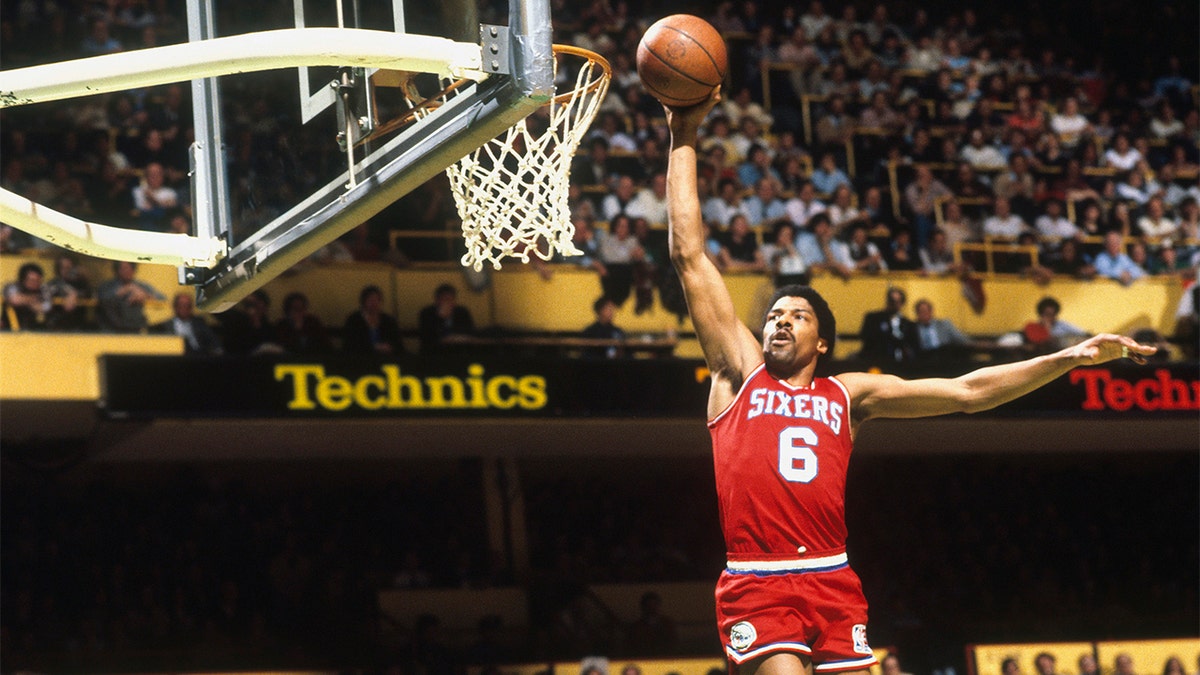
Julius Erving, nicknamed "Dr. J", is No. 14 on the list of the greatest players in NBA history. (Photo by Focus on Sport via Getty Images)
YEARS PLAYED: Virginia Squires (1971-1973); New York Nets (1973-1976); Philadelphia 76ers (1976-1987)
CAREER STATISTICS: 24.2 PPG, 8.5 RPG, 4.2 APG
LIST OF ACCOLADES: 1x NBA Champion; 2x ABA Champion; 1981 NBA MVP; 3x ABA MVP; 11x NBA All-Star; 5x ABA All-Star; 5x All-NBA First Team; 2x All-NBA Second Team; 4x All-ABA First Team; 1x All-ABA Second Team; 1x ABA All-Defensive First Team; ABA All-Time Team; Basketball Hall of Fame Class of 1993
WHY IS JULIUS ERVING NO. 14?
Erving, regarded as one of the most influential players of all-time, was known for his "above-the-rim" style of play while playing in both the ABA and NBA. Erving began his career in the ABA (American Basketball Association), and he was the league's most well-known player when the two leagues merged after the 1975-76 season.
"Dr. J" won a total of three championships, four MVP awards, and three scoring titles while playing for the Virginia Squires, New York Nets, and Philadelphia 76ers over 16 seasons. Erving is the only player in basketball history to win an MVP in both the ABA and NBA.
Erving is also one of the few players in history to have his number retired by two different franchises -- the Nets retired his No. 32, and the 76ers his No. 6 jersey. When he retired in 1987, Erving ranked in the top five in scoring (third), field goals made (third), field goals attempted (fifth), and steals (first). He is currently eighth on the all-time ABA/NBA combined scoring list.
**
13) JERRY WEST

Los Angeles Lakers all-time great Jerry West is locked in at No. 13. (Photo by Focus on Sport/Getty Images)
YEARS PLAYED: Los Angeles Lakers (1960-1974)
CAREER STATISTICS: 27.0 PPG, 6.7 APG, 5.8 RPG
LIST OF ACCOLADES: 1x NBA Champion; 1969 NBA Finals MVP; 14x NBA All-Star; 10x All-NBA First Team; 2x All-NBA Second Team; 4x NBA All-Defensive First Team; 1x NBA All-Defensive Second Team; 1970 NBA Scoring Champion; Basketball Hall of Fame Class of 1980
WHY IS JERRY WEST NO. 13?
West, the NBA's logo, was given the nickname "Mr. Clutch" because when the game was on the line, his teammates knew that the basketball should be in his hands. When West retired, he finished with 25,192 points (third), averaged 27.0 PPG (fourth), successfully hit 7,160 free throws (second), and had 6,238 assists (fifth). Equally as dominant on defense, West was a four-time NBA All-Defensive first-team selection.
The No. 13 spot is only fitting for West, who is easily one of the unluckiest players in NBA history. In his career, West lost eight out of nine times in the NBA Finals. He is also the only player in league history to be named Finals MVP despite a losing effort in 1969. West holds the record for the most points in a playoff series, when he averaged 46.3 PPG against the Baltimore Bullets in the first round of the 1965 NBA Playoffs. Among retired NBA players, only Michael Jordan (30.1), Wilt Chamberlain (30.0), and Elgin Baylor (27.3) have a higher points-per-game average than West's 27.0 PPG.
Not only was West a great player on the court, but his legacy continued off the court as well. West, a two-time NBA Executive of the Year, went on to win seven NBA championships as a general manager. He was the architect in building the '80s Lakers dynasty under coach Pat Riley and Hall of Fame players Magic Johnson, Kareem-Abdul-Jabbar, and James Worthy. West also developed the Lakers in the 2000s with Hall of Famers Shaquille O'Neal and Kobe Bryant under head coach Phil Jackson.
KOBE BRYANT 'TRULY THOUGHT HE WAS BETTER THAN MICHAEL JORDAN,' NBA GREAT TRACY MCGRADY RECALLS
**
12) OSCAR ROBERTSON
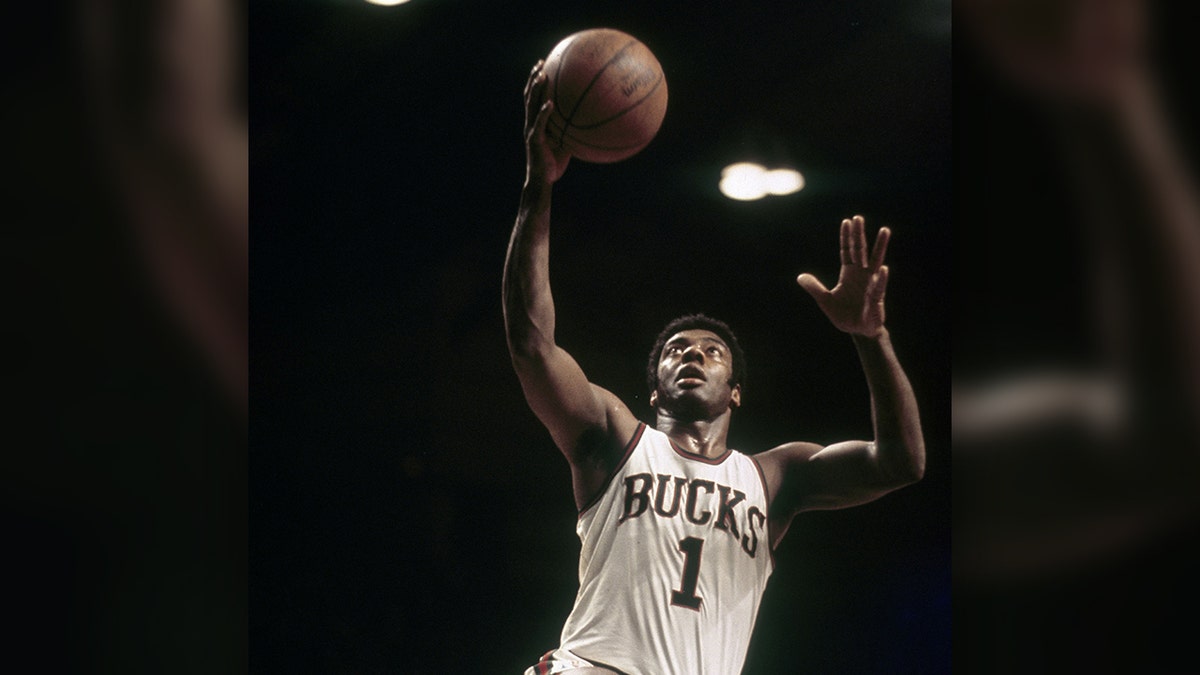
Milwaukee Bucks legend Oscar Robertson comes in at No. 12. (Photo by Focus on Sport/Getty Images)
YEARS PLAYED: Cincinnati Royals (1960-1970); Milwaukee Bucks (1970-1974)
CAREER STATISTICS: 25.7 PPG, 9.5 APG, 7.5 RPG
LIST OF ACCOLADES: 1x NBA Champion; 1964 NBA MVP; 12x NBA All-Star; 9x All-NBA First Team; 2x All-NBA Second Team; 1961 Rookie of the Year; 6x NBA Assists Leader; Basketball Hall of Fame Class of 1980
WHY IS OSCAR ROBERTSON NO. 12?
Robertson, who averaged 30.8 points, 12.5 rebounds, and 11.4 assists during the 1962 NBA season, was the first player in league history to average a triple-double. The record stood for 55 years before Russell Westbrook averaged a triple-double for three consecutive seasons from 2017-2019.
Before entering the NBA, Robertson put together a historic college career at the University of Cincinnati. He had 14 NCAA records and 19 school records, and he led the Bearcats to an incredible 79-9 overall record and two Final Four appearances in three seasons. When he was drafted by the Cincinnati Royals in 1960, he immediately stepped into a starting role, and was effective on the court as a scorer from Day One. He averaged 30.5 points as a rookie, which led to Rookie of the Year honors.
Robertson averaged 30 or more points in six of his first seven seasons. There are only three other players in league history to average 30+ points in a season more times than Robertson. He was also the first player in the NBA to average more than 10 assists per game, and he was the first guard to average 10 or more rebounds in a season. When he retired, he was the league's all-time assists leader, and the second leading scorer behind Wilt Chamberlain.
**
11) HAKEEM OLAJUWON

Houston Rockets legendary center Hakeem Olajuwon is the No. 11 greatest player of all-time. (Photo by BOB STRONG / AFP)
YEARS PLAYED: Houston Rockets (1984-2001); Toronto Raptors (2001-2002)
CAREER STATISTICS: 21.8 PPG, 11.1 RPG, 3.1 BPG
LIST OF ACCOLADES: 2x NBA Champion; 2x NBA Finals MVP; 1994 NBA MVP; 12x NBA All-Star; 6x All-NBA First Team; 3x All-NBA Second Team; 3x All-NBA Third Team; 2x NBA Defensive Player of the Year; 5x NBA All-Defensive First Team; 4x NBA All-Defensive Second Team; 2x NBA Rebounding Leader; 3x NBA Blocks Leader; Basketball Hall of Fame Class of 2008
WHY IS HAKEEM OLAJUWON NO. 11?
Olajuwon, one of the greatest centers in the history of the NBA, led the Houston Rockets to back-to-back titles in 1994 and 1995. He was the No. 1 overall pick in the 1984 NBA Draft, a draft which included Michael Jordan, Charles Barkley and John Stockton.
When he led the Rockets to the championship in 1994, Olajuwon became the only player in league history to win the NBA MVP, Defensive Player of the Year, and NBA Finals MVP in the same season. He finished his career as the NBA leader in blocks (3,830), and he is one of only four players ever to come away with a quadruple-double.
Nicknamed "The Dream," Olajuwon is the only player to have more than 200 blocks and 200 steals in the same season, and he is the lone player in league history to have more than 3,000 blocked shots and 2,000 steals in a career. The Basketball Hall of Fame website says Olajuwon was "blessed with soft hands, great balance, and flawless footwork," and his signature move the "Dream Shake" is regarded as one of the best post moves created. It was known that NBA greats Kobe Bryant, LeBron James, among others, went to the big man for advice on footwork down low.
**
10) BILL RUSSELL

Bill Russell, the Boston Celtics all-time great, comes in at No. 10. (Photo by Focus on Sport/Getty Images)
YEARS PLAYED: Boston Celtics (1956-1969)
CAREER STATISTICS: 15.1 PPG, 22.5 RPG, 4.3 APG
LIST OF ACCOLADES: 11x NBA Champion; 5x NBA MVP; 12x NBA All-Star; 3x All-NBA First Team; 8x All-NBA Second Team; 1x NBA All-Defensive First Team; 4x NBA Rebounding Leader; Basketball Hall of Fame Class of 1975
WHY IS BILL RUSSELL NO. 10?
Russell, an 11-time NBA champion, is arguably the greatest teammate ever, as he proved to be a core piece of the Boston Celtics dynasty for all 13 years of his career. Russell never averaged 19 points per game in a season, and he shot 44 percent from the field, and 56 percent from the free-throw line over his career, but he was known for his shot-blocking, rebounding and tenacious defense.
Russell's 11 titles make him the winningest player in NBA history, and during his incredible run, he played with some all-time great players in Sam Jones, K.C. Jones, Tom Heinsohn, Bill Sharman, John Havlicek and Bob Cousy. Over his career, Russell won five NBA MVPs, which is tied with Michael Jordan for second all-time, only behind Kareem Abdul-Jabbar's six awards. Former Celtics' player Don Nelson once told the Boston Herald, "There are two types of superstars. One makes himself look good at the expense of the other guys on the floor. But there's another type who makes the players around him look better than they are, and that's the type Russell was."
You may question why Russell isn't higher on this list, and here's the answer to that: Russell played during an era where there were between 8-14 NBA teams, which obviously isn't his fault, but he wasn't even the best player at his position during that time -- Wilt Chamberlain was. When Chamberlain entered the NBA in 1960, there were only four players in the league who were taller than 6-foot-8, including Chamberlain at 7-foot-1 and Russell at 6-foot-10. Even though Russell was the greatest individual winner in a sport which is a team game, he was surrounded by a cast of fellow Hall of Famers, and it was during a time where the league lacked talent as a whole.
SPURS WOULD HAVE BEATEN MICHAEL JORDAN-LED BULLS IN HYPOTHETICAL 1999 NBA FINALS, EX-PLAYER SAYS
**
9) LARRY BIRD
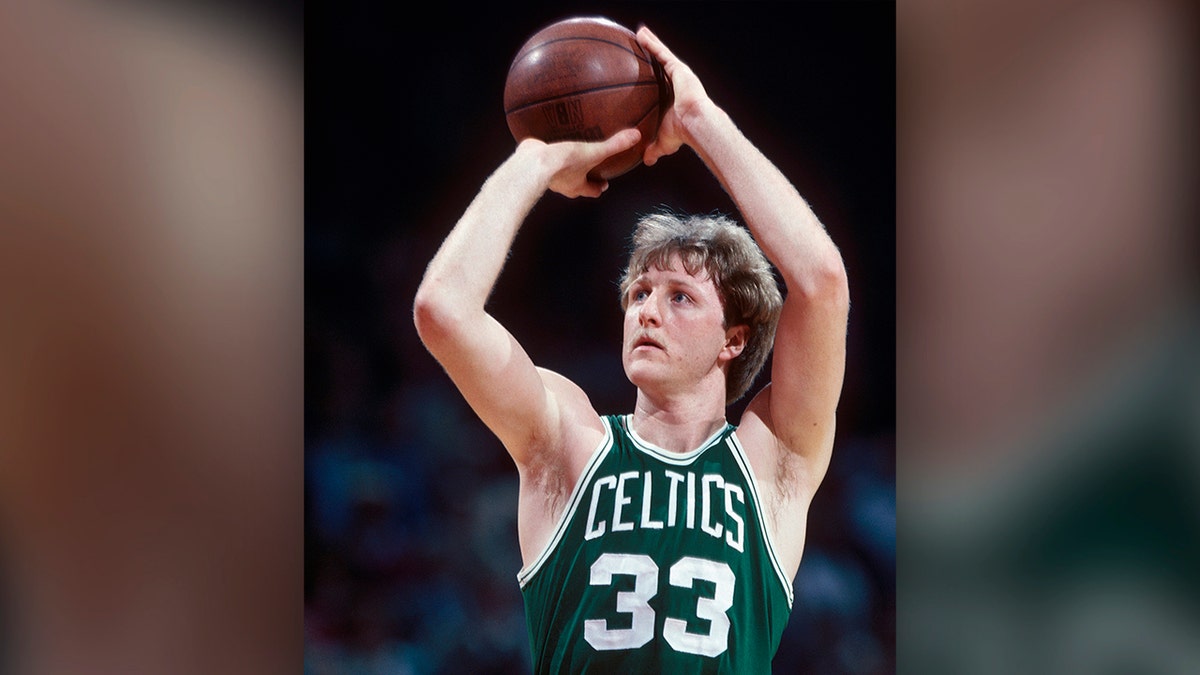
Boston Celtics legend Larry Bird is the No. 9 greatest player in NBA history. (Photo by Focus on Sport via Getty Images)
YEARS PLAYED: Boston Celtics (1979-1992)
CAREER STATISTICS: 24.3 PPG, 10.0 RPG, 6.3 APG
LIST OF ACCOLADES: 3x NBA Champion; 2x NBA Finals MVP; 3x NBA MVP; 12x NBA All-Star; 9x All-NBA First Team; 1x All-NBA Second Team; 3x NBA All-Defensive Second Team; 1980 Rookie of the Year; Basketball Hall of Fame Class of 1998
WHY IS LARRY BIRD NO. 9?
Bird, the No. 6 overall pick in the 1978 NBA Draft, is one of the greatest players and shooters in league history. Bird, who won three championships with the Boston Celtics and was named NBA Finals MVP twice, was a 12-time All-Star in 13 seasons, and he was honored as the league's regular-season MVP three straight seasons from 1984 to 1986. As of 2020, Bird is the only person in NBA history to be named Rookie of the Year, NBA MVP, NBA Finals MVP, All-Star MVP, Coach of the Year, and Executive of the Year.
Bird entered the NBA during a time when the league needed a much-needed boost. Bird, and fellow rookie and Los Angeles Lakers legend Magic Johnson, rejuvenated the league and they brought the NBA to new heights in the '80s.
Bird was the first player in NBA history to shoot 50 percent or better from the field, 40 percent on 3-pointers, and 90 percent from the free-throw line in a single season. Bird was also a member of the gold medal-winning 1992 "Dream Team." Back in 2018, in a list of the 20 best players in franchise history, MSN Sports ranked Bird as the greatest Celtics player of all-time.
**
8) WILT CHAMBERLAIN

Wilt Chamberlain, a four-time NBA MVP, comes in at No. 8. (Photo by Focus on Sport/Getty Images)
YEARS PLAYED: Harlem Globetrotters (1958-1959); Philadelphia/San Francisco Warriors (1959-1965); Philadelphia 76ers (1965-1968); Los Angeles Lakers (1968-1973)
CAREER STATISTICS: 30.1 PPG, 22.9 RPG, 4.4 APG
LIST OF ACCOLADES: 2x NBA Champion; 1972 NBA Finals MVP; 4x NBA MVP; 13x NBA All-Star; 7x All-NBA First Team; 3x All-NBA Second Team; 2x NBA All-Defensive First Team; 1960 Rookie of the Year; 7x NBA Scoring Champion; 11x NBA Rebounding Leader; 1968 NBA Assists Leader; Basketball Hall of Fame Class of 1979
WHY IS WILT CHAMBERLAIN NO. 8?
Chamberlain was the first center to do it all. While playing for the Philadelphia/San Francisco Warriors, Philadelphia 76ers, and eventually the Los Angeles Lakers, Chamberlain put together an unbelievable statistical career that is in a stratosphere of its own. He has a ton of NBA records when it comes down to scoring and rebounding. Chamberlain is the only player to score 100 points or more in a single game, he won seven scoring titles and 11 rebounding titles, and he's the lone player in league history to average more than 30 points and 20 rebounds per game over an NBA career. He scored 50 or more points 118 times, 60 or more points 32 times, and is the NBA's all-time leading rebounder with 23,924 boards, which is a record that will never be broken. Chamberlain, a two-time NBA champion, was a four-time league MVP and was selected to 13 All-Star and 10 All-NBA teams.
All of the records and accolades are a huge part of Chamberlain's resume, but because his skills were so far beyond his years, rule changes were instituted to control his abilities. Back in 1964, the free throw lane was widened a second time, from 12 to 16 feet because Chamberlain would throw the ball up toward the basket, jump toward the rim, and dunk the ball. Both the NCAA and NBA introduced a rule stating that a player cannot cross the free-throw line when shooting a free throw attempt. There was another rule that was established thanks to Chamberlain. Inbounders could stand underneath the basket, and they would lob the ball over the backboard for Chamberlain, who would be there to put the basketball in the hoop. After teams found no way to defend it, the league created a rule stating that the ball cannot be inbounded over the backboard.
Like Bill Russell, Chamberlain played in an era where there were between 8-14 NBA teams, and when he entered the NBA in 1960, there were only four players in the league who were taller than 6-foot-8, including Chamberlain at 7-foot-1 and Russell at 6-foot-10. There is no doubt about it that Chamberlain was a dominant force during his playing days, but his numbers wouldn't have been as inflated if he played in the '80s, '90s or later.
**
7) TIM DUNCAN
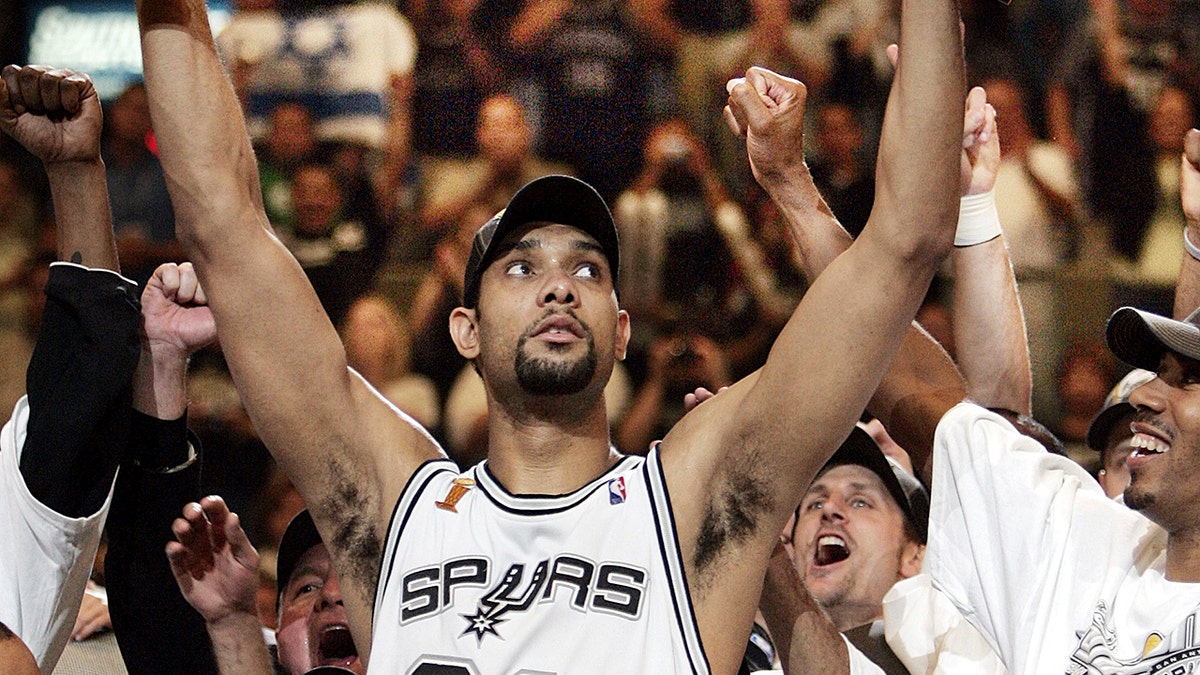
Tim Duncan, arguably the best power forward of all-time, is the No. 7 greatest player in NBA history. (AP Photo/Eric Gay, File)
YEARS PLAYED: San Antonio Spurs (1997-2016)
CAREER STATISTICS: 19.0 PPG, 10.8 RPG, 2.2 BPG
LIST OF ACCOLADES: 5x NBA Champion; 3x NBA Finals MVP; 2x NBA MVP; 15x NBA All-Star; 10x All-NBA First Team; 3x All-NBA Second Team; 2x All-NBA Third Team; 8x NBA All-Defensive First Team; 7x NBA All-Defensive Second Team; 1998 Rookie of the Year; Basketball Hall of Fame Class of 2020
WHY IS TIM DUNCAN NO. 7?
Duncan, nicknamed "The Big Fundamental," is often regarded as the greatest power forward in NBA history. He was a back-to-back NBA MVP in 2002 and 2003, and a five-time NBA champion with the San Antonio Spurs. Duncan was named to 15 NBA All-Star teams as well as 15 All-NBA and 15 All-Defensive teams. Duncan and Kareem Abdul-Jabbar are the only two players in NBA history with 26,000+ points, 15,000+ rebounds and 3,000+ blocks.
Duncan is also one of only four players to be recognized as an All-NBA first-team player in each of his first eight seasons in the league, and he's the only player in NBA history to receive All-NBA and All-Defensive honors in the first 13 seasons of a career. Duncan is one of only four players to be the No. 1 overall pick, and win Rookie of the Year, NBA MVP and Finals MVP. The other three players who accomplished those feats: Abdul-Jabbar, Shaquille O'Neal and LeBron James.
After Duncan won his first NBA title in 1999, Sports Illustrated put out an article describing the 6-foot-11 power forward as a "quiet, boring MVP," and in a book written by sports journalist Kevin Kernan titled "Slam Duncan," the Spurs' legend himself touched on his boring image by saying, "If you show excitement, then you also may show disappointment or frustration. If your opponent picks up on this frustration, you are at a disadvantage."
Duncan is the Spurs' all-time leader in points (26,496), rebounds (15,091), blocks (3,020), minutes (47,368) and games played (1,392).
SCOTTIE PIPPEN IS 'BEYOND LIVID' ABOUT HOW MICHAEL JORDAN PORTRAYED HIM IN 'THE LAST DANCE'
**
6) KOBE BRYANT
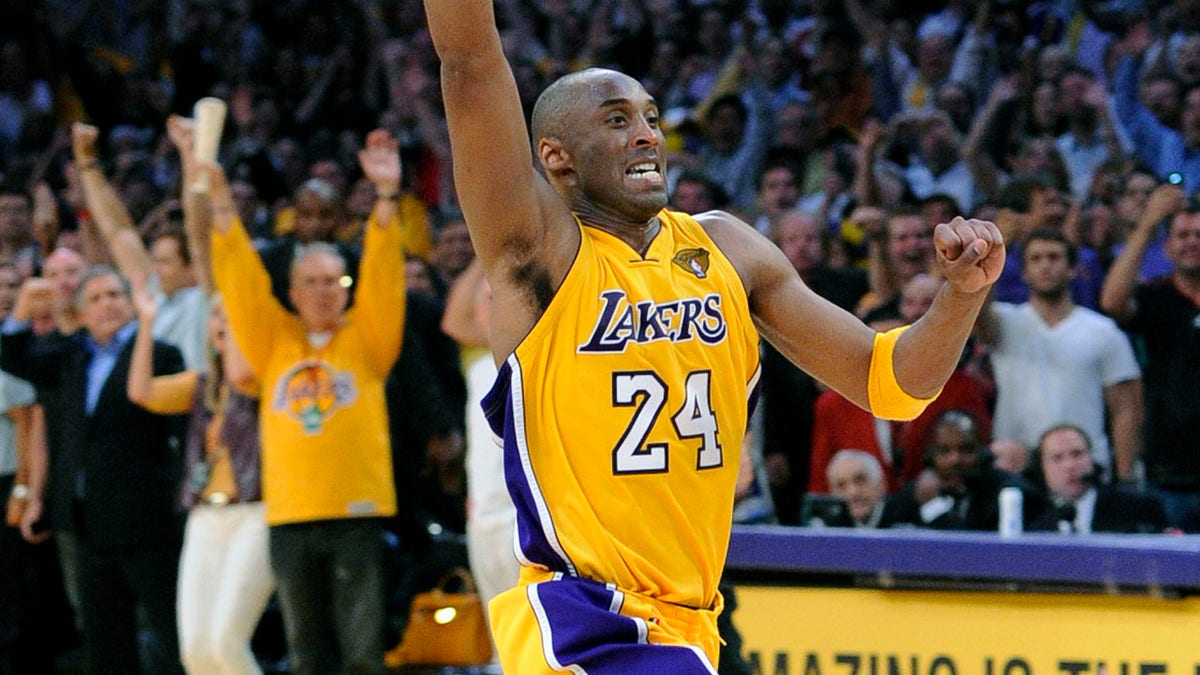
Los Angeles Lakers legend Kobe Bryant comes in at No. 6. (AP Photo/Mark J. Terrill, File)
YEARS PLAYED: Los Angeles Lakers (1996-2016)
CAREER STATISTICS: 25.0 PPG, 5.2 RPG, 4.7 APG
LIST OF ACCOLADES: 5x NBA Champion; 2x NBA Finals MVP; 2008 NBA MVP; 18x NBA All-Star; 11x All-NBA First Team; 2x All-NBA Second Team; 2x All-NBA Third Team; 9x NBA All-Defensive First Team; 3x NBA All-Defensive Second Team; 2x NBA Scoring Champion; Basketball Hall of Fame Class of 2020
WHY IS KOBE BRYANT NO. 6?
Bryant, who entered the league straight out of Lower Merion High School in Pennsylvania, spent his entire 20-year career with the Los Angeles Lakers, where he was a five-time NBA champion and two-time NBA Finals MVP.
The "Black Mamba" was an 18-time NBA All-Star (second all-time only behind Kareem Abdul-Jabbar), 15-time All-NBA selection (tied with Abdul-Jabbar and Tim Duncan for the most all-time), and 12-time NBA All-Defensive honoree, which includes nine All-Defensive first-team selections (tied with Michael Jordan, Kevin Garnett and Gary Payton for the most ever). Bryant, who has two jersey numbers retired by the Lakers -- No. 8 and No. 24 -- is the all-time leading scorer (33,643 points) in franchise history.
Bryant, the first guard to play at least 20 seasons in the league, scored a career-high 81 points in 2006 against the Toronto Raptors, which is the second-most points scored in a single game in NBA history -- Wilt Chamberlain scored 100 points in a game back in 1962. In his final NBA game in 2016, Bryant scored an NBA season-high 60 points against the Utah Jazz in the Lakers' 101–96 victory. He became the oldest player to score 60+ points in a game at 37 years and 234 days old.
**
5) MAGIC JOHNSON
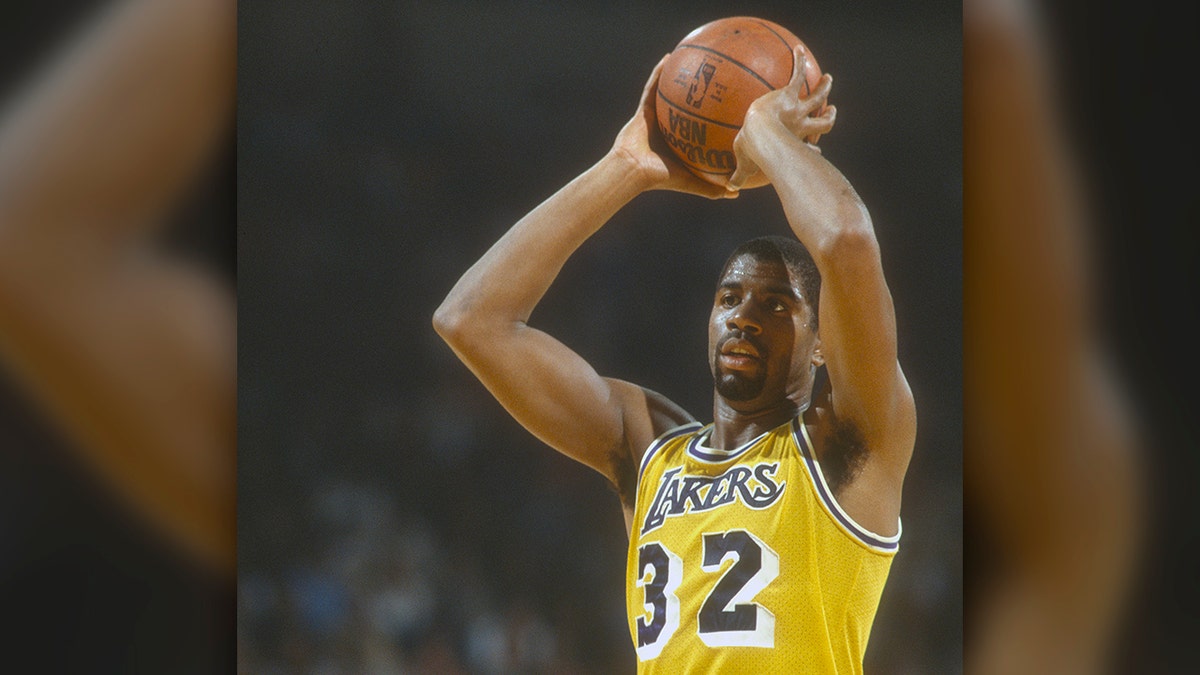
Los Angeles Lakers legend Magic Johnson is the No. 5 greatest player of all-time. (Photo by Focus on Sport/Getty Images)
YEARS PLAYED: Los Angeles Lakers (1979-1991); Los Angeles Lakers (1996)
CAREER STATISTICS: 19.5 PPG, 11.2 APG, 7.2 RPG
LIST OF ACCOLADES: 5x NBA Champion; 3x NBA Finals MVP; 3x NBA MVP; 12x NBA All-Star; 9x All-NBA First Team; 1x All-NBA Second Team; 4x NBA Assists Leader; 2x NBA Steals Leader; Basketball Hall of Fame Class of 2002
WHY IS MAGIC JOHNSON NO. 5
Johnson, the No. 1 overall pick in the 1979 NBA Draft, was a star at point guard for the Los Angeles Lakers for 13 seasons. A three-time NBA MVP, "Magic" Johnson made nine NBA Finals appearances and won five NBA titles, which included a championship in his rookie season when he was honored as NBA Finals MVP. Johnson also participated in 12 NBA All-Star games, and was a 10-time All-NBA selection.
Johnson's 11.2 assists per game average is the best in NBA history. He has the most assists in NBA playoff history (2,346), holds a share of the single-game playoff record for assists with 24, and the NBA Finals record for assists in a game with 21. Johnson, the ringleader of the "Showtime" Lakers, was the master of "no-look passes off the fastbreak, pin-point alley-oops from halfcourt, spinning feeds, and overhand bullets under the basket through triple teams," according to NBA.com. In 2006, ESPN.com said that Johnson was the greatest point guard of all time, stating, "It could be argued that he's the one player in NBA history who was better than Michael Jordan."
Johnson finished his career with 17,707 points, 6,559 rebounds, 10,141 assists, and 1,724 steals. There's no doubt about it that Johnson's rivalry with Boston Celtics legend Larry Bird is what took the NBA to new heights, and turned it into a global, multibillion-dollar industry that the NBA is today. When Johnson's Lakers battled Bird's Celtics in the '80s, it proved to be one of the most famous and greatest rivalries in all of sports.
**
4) KAREEM ABDUL-JABBAR

Kareem Abdul-Jabbar comes in at No. 4. (Photo by Focus on Sport/Getty Images)
YEARS PLAYED: Milwaukee Bucks (1969-1975); Los Angeles Lakers (1975-1989)
CAREER STATISTICS: 24.6 PPG, 11.2 RPG, 3.6 APG
LIST OF ACCOLADES: 6x NBA Champion; 2x NBA Finals MVP; 6x NBA MVP; 19x NBA All-Star; 10x All-NBA First Team; 5x All-NBA Second Team; 5x NBA All-Defensive First Team; 6x NBA All-Defensive Second Team; 1970 Rookie of the Year; 2x NBA Scoring Champion; 1976 NBA Rebounding Champion; 4x NBA Blocks Leader; Basketball Hall of Fame Class of 1995
WHY IS KAREEM ABDUL-JABBAR NO. 4?
Abdul-Jabbar, a league-record six-time NBA MVP and record 19-time NBA All-Star, was a 15-time All-NBA selection, and an 11-time NBA All-Defensive honoree. He led the Milwaukee Bucks to their first championship in 1971, and after he joined the Los Angeles Lakers in 1975, he won five more titles with Magic Johnson. Abdul-Jabbar, the first player in league history to play 20 seasons, made 18 playoff appearances, and he played in 10 NBA Finals. His famous shot, known as the "skyhook," is one of the greatest offensive scoring moves in league history because of the degree of difficulty it is for a defensive player. Back in 2006, Abdul-Jabbar told the Los Angeles Times that he learned the move in fifth grade, and he valued it because it's "the only shot I could use that didn't get smashed back in my face."
When Abdul-Jabbar retired in 1989, he was the NBA's all-time leader in points scored (38,387), games played (1,560), minutes played (57,446), field goals made (15,837), field goal attempts (28,307), blocked shots (3,189), defensive rebounds (9,394), career wins (1,074), and personal fouls (4,657). He's still the all-time leader in points scored, field goals made, and career wins. Back in 2007, ESPN.com ranked him as the greatest center of all-time, and in 2008 they said that he is the greatest college basketball player ever. Under head coach John Wooden at UCLA, Abdul-Jabbar won three straight national championships and was a record three-time MVP of the NCAA Tournament.
Abdul-Jabbar's resume certainly puts him in the conversation as the greatest player in league history. Detroit Pistons legendary point guard Isiah Thomas once said in an article published in 2012 in the Chicago Tribune: "If they say the numbers don't lie, then Kareem is the greatest ever to play the game." And former Lakers head coach Pat Riley believes it as well. He said, "Why judge anymore? When a man has broken records, won championships, endured tremendous criticism and responsibility, why judge? Let's toast him as the greatest player ever."
CLICK HERE FOR MORE SPORTS COVERAGE ON FOXNEWS.COM
**
3) SHAQUILLE O'NEAL
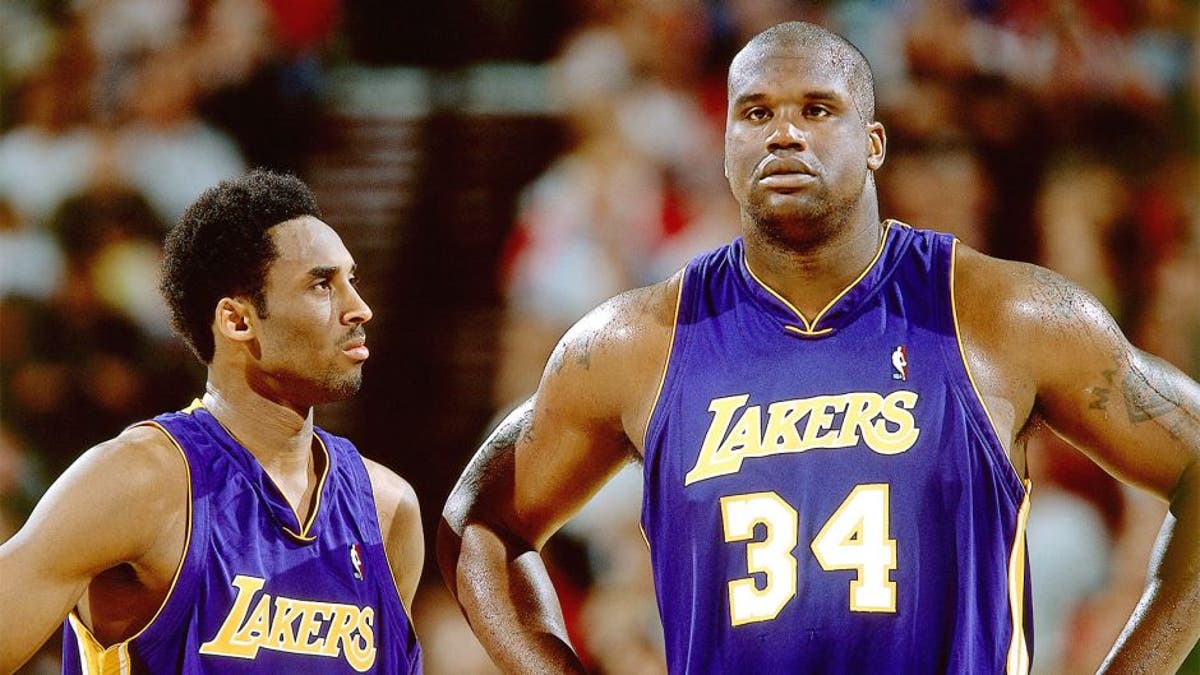
Shaquille O'Neal (right) is the No. 3 greatest player in NBA history. (Photo by Sam Forencich/NBAE via Getty Images)
YEARS PLAYED: Orlando Magic (1992-1996); Los Angeles Lakers (1996-2004); Miami Heat (2004-2008); Phoenix Suns (2008-2009); Cleveland Cavaliers (2009-2010); Boston Celtics (2010-2011)
CAREER STATISTICS: 23.7 PPG, 10.9 RPG, 2.3 BPG
LIST OF ACCOLADES: 4x NBA Champion; 3x NBA Finals MVP; 2000 NBA MVP; 15x NBA All-Star; 8x All-NBA First Team; 2x All-NBA Second Team; 4x All-NBA Third Team; 3x NBA All-Defensive Second Team; 1993 Rookie of the Year; 2x NBA Scoring Champion; Basketball Hall of Fame Class of 2016
WHY IS SHAQUILLE O'NEAL NO. 3?
O'Neal, a four-time NBA champion and three-time Finals MVP, is the most dominant force in league history. He's in the conversation of the greatest center of all-time -- alongside Kareem Abdul-Jabbar, Hakeem Olajuwon, Bill Russell, and Wilt Chamberlain -- but he played his best when it mattered most. If it wasn't for Michael Jordan and his six titles in six NBA Finals appearances, O'Neal may have been the greatest NBA Finals player ever. He was the Finals MVP three straight seasons from 2000 to 2002, and his per-game averages for the 2000 Finals against the Indiana Pacers consisted of 45 minutes played, 38 points, and 17 rebounds, and in the 2001 NBA Finals, when the Los Angeles Lakers squared off against the Philadelphia 76ers and center Dikembe Mutombo -- who was considered the best defensive center of his generation -- O'Neal's point and rebound totals in the five games were: 44 points, 20 rebounds; 28-20; 30-12; 34-14; 29-13.
"He makes 6’11, 270-pounders look like they're not even there," said then Nets President of Basketball Operations Rod Thorn about O'Neal in 2001 to USA Today. "I don't know if we've ever had a player with the combination of quickness, strength, and size as Shaq. (Bill) Russell was finesse; (Kareem) Abdul-Jabbar was elegant, very talented but not physical. Shaq whips you down, then dunks you through the basket.
"For the time (Chamberlain) played, Wilt was bigger, stronger, and quicker than every player who was near his size. Shaq is bigger, stronger, and quicker than Wilt."
O'Neal's pure dominance was the reason why the NBA was forced to change its rules. First, when O'Neal was a member of the Orlando Magic in 1993, he made a put-back dunk that was so strong, that it basically broke the backboard, and the goal ended up folding and lowering to the floor. This caused the NBA to have a backup hoop in every arena.
Prior to the 2001-02 NBA season, the league eliminated its illegal defense rules. That allowed teams to use zone defenses, with the only restriction being that no player could stay in the paint for more than three seconds unless he was guarding someone. This made the lane more crowded, and not only did O'Neal have to beat his own man, but he had to overcome the other two or three players that were in defensive help positions. For years, the NBA forced players to either guard their man or double the man with the ball. Any player caught guarding an area and not a man would elicit a technical foul shot. In the '90s, coaches developed strategies to abuse the man-to-man. Teams would isolate their best scorer in the post with his teammates as far away on the other side of the court as possible, to make it hard to double. It was no coincidence that the rule change came during O'Neal's prime.
Another rule change came thanks to former Dallas Mavericks head coach Don Nelson, who was the creator of the "Hack-a-Shaq" defensive strategy. Teams would commit personal fouls throughout the game against selected opponents who shot free throws poorly. And since O'Neal shot an abysmal 52.7 percent from the free-throw line during his career, opposing coaches would purposely put him on the line, since he was basically impossible to defend. But games quickly became difficult to watch, and another rule change was put in place prior to the 2016–17 NBA season: "Away-from-the-ball fouls now award the fouled team a free throw and possession of the ball in the final two minutes of each quarter. The rule change sought to eliminate cases where teams would intentionally foul off-the-ball in order to gain the final possession of a quarter."
“I’m the reason they changed the rules,” O’Neal told Sean Deveney of Sporting News. “I am the reason they wanted to get people out of the paint because there was no one who could stop me, so they changed the rules.”
**
2) LEBRON JAMES

LeBron James comes in at No. 2. (Mandatory Credit: David Richard-USA TODAY Sports)
YEARS PLAYED: Cleveland Cavaliers (2003-2010); Miami Heat (2010-2014); Cleveland Cavaliers (2014-2018); Los Angeles Lakers (2018-present)
CAREER STATISTICS: 27.1 PPG, 7.4 RPG, 7.4 APG
LIST OF ACCOLADES: 3x NBA Champion; 3x NBA Finals MVP; 4x NBA MVP; 16x NBA All-Star; 12x All-NBA First Team; 2x All-NBA Second Team; 1x All-NBA Third Team; 5x NBA All-Defensive First Team; 1x NBA All-Defensive Second Team; 2004 Rookie of the Year; 2008 NBA Scoring Champion
WHY IS LEBRON JAMES NO. 2?
James, who entered the NBA out of St. Vincent-St. Mary High School in 2003, is frequently in the greatest of all-time discussion with Chicago Bulls legend Michael Jordan. Luckily enough for James, he still has a few years left in his career to cement his legacy. A three-time NBA champion and three-time Finals MVP, James has been named to 15 All-NBA teams, which is tied for the most in league history. James, along with Boston Celtics legend Bill Russell, won four NBA MVPs over a five-year span. They are the only two players in the history of the NBA to do so.
While playing for the Miami Heat and Cleveland Cavaliers, James led his teams to eight-straight NBA Finals appearances from 2011 to 2018. He holds the NBA record for most points in the playoffs, and he's third all-time in points and eighth in assists. In the 2016 NBA Finals, James led the Cavaliers back from a 3-1 series deficit against the Golden State Warriors and delivered Cleveland's first championship in 52 years.
NBA analyst Brian Windhorst spent a large majority of his journalism career covering James, and he said in an ESPN article that, "No one has ever had as much hype as James has had to live up to, and James has delivered on every last drop."
**
1) MICHAEL JORDAN
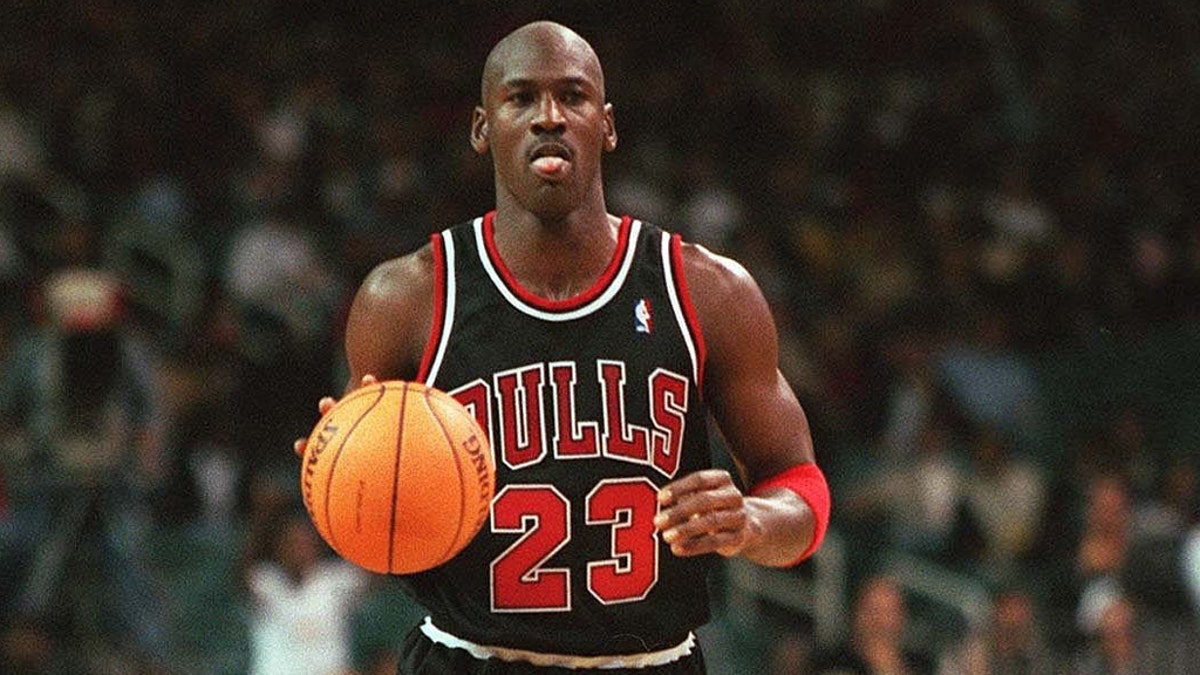
Chicago Bulls legend Michael Jordan is the greatest player in NBA history. (Photo by Alexander Hassenstein/Bongarts/Getty Images)
YEARS PLAYED: Chicago Bulls (1984-1993; 1995-1998); Washington Wizards (2001-2003)
CAREER STATISTICS: 30.1 PPG, 6.2 RPG, 5.3 APG
LIST OF ACCOLADES: 6x NBA Champion; 6x NBA Finals MVP; 5x NBA MVP; 14x NBA All-Star; 10x All-NBA First Team; 1x All-NBA Second Team; 1988 NBA Defensive Player of the Year; 9x NBA All-Defensive First Team; 1985 Rookie of the Year; 10x NBA Scoring Champion; 3x NBA Steals Leader; Basketball Hall of Fame Class of 2009
WHY IS MICHAEL JORDAN NO. 1?
Jordan won six NBA championships in six appearances, and the official NBA website states that "by acclamation, Michael Jordan is the greatest basketball player of all time." A 14-time All-Star, five-time NBA MVP, six-time Finals MVP, and 11-time All-NBA selection, Jordan became the first player in league history to win both the NBA Defensive Player of the Year award and NBA MVP in a career. Since then, the only players to achieve both honors are Hakeem Olajuwon, David Robinson, and Kevin Garnett. Both Jordan and Olajuwon are the only players to win both awards in the same season.
Jordan led the NBA in scoring a record 10 times, and he's one of only four players -- Kevin Garnett, Kobe Bryant and Gary Payton are the others -- to make the NBA All-Defensive first-team nine times. Jordan has the NBA record for the highest career regular-season scoring average with 30.1 points per game, and the highest career playoff average with 33.4 points per game. In 1999, Jordan was named the greatest North American athlete of the 20th century by ESPN.
